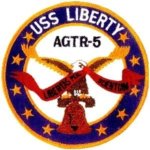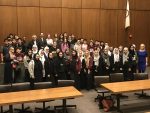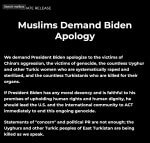American Arabs share in 75th Pearl Harbor remembrance
Millions of American Arabs have much to be proud of as the United States commemorates the 75th anniversary of the surprise Japanese attack on Pearl Harbor on Dec. 7, 1941 which pushed America into World War II. More than 15,000 American Arabs served during that war and represented a consistent stream of Arab patriotism for this nation
By Ray Hanania
Millions of American Arabs have much to be proud of as the United States commemorates the 75th anniversary of the surprise Japanese attack on Pearl Harbor on Dec. 7, 1941 which pushed America into World War II.
More than 15,000 American Arabs served during World War II in the Pacific, in Europe and in North Africa representing a consistent stream of patriotism for their adopted nation. They defended the United States, defeating the Japanese in the Pacific and the Nazi Germans in Europe.
My father George and his brother Mousa (Moses) both were inspired to enlist in the military immediately after the Pearl Harbor attack and they fought through the entire war until it ended in the summer of 1945 with Germany’s defeat and Japan’s surrender.
The Pearl Harbor attack took the lives of 2,335 Americans and injured 1,143 others. It began at 7:55 am Hawaii time and lasted nearly two hours, destroying many of the American naval battle ships and destroyers that were in the harbor.
My uncle Moses immigrated to America in the early 1920s from his home in Jerusalem, Palestine, which was under a British Mandate assigned by the League of Nations that was created after World War I. He settled in Chicago and found a job as a cook at the Rolling Green Country Club in Arlington Heights. A newspaper article published at the time reported that the County Club had been robbed at gunpoint and my uncle was among those whose life savings had been stolen. The newspaper said he lost $800 in the robbery, which was a considerable amount of money in the 1930s.
My father, George, immigrated to America in 1926 after another older brother, Yusef (Joseph), had drowned while swimming at the quarry just outside of Jerusalem in early 1926. George was studying to be a lawyer but was discouraged when the British Police report stated that Yusef Hanania had died because no one would save him.
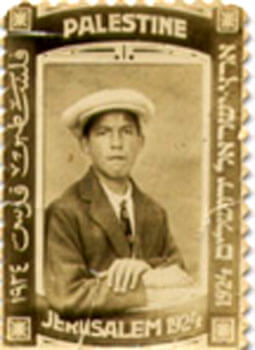
There were many people at the shore of the quarry who could have helped at the time. It was April 21, 1926. But Palestine was rife with religious conflict. Jews refused to help Yusef because he was Christian. Muslims refused to help Yusef because they thought he was Jewish. Christians refused to help Yusef because they believed he was not Christian.
In September, my father left his job where he worked at the Jerusalem Post Office with an uncle, Issa Hanania, with a visa and Palestine “laissez passer” (passport) that he received from the U.S. Embassy to legally immigrate to America. He boarded a steamship, the S.S. Sinaea and lived in the ship’s steerage for the nearly 30 days it took for the ship to cross the Atlantic.
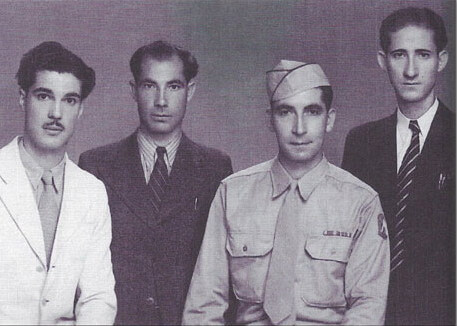
My dad moved in with his oldest brother Mousa who lived at 2100 N. Clybourn Avenue in Chicago. Dad worked at the Fenske Brothers Center on North Clybourn Avenue, a furniture manufacturer, and then later found work as an usher at the Astor Theater and then at the LaSalle Street Theater. He even worked with his brother at the Rolling Green Country Club, whose manager Ms. Mini Stiff, became my Godmother years later after he married my mother (who he met in an arranged marriage in front of the Church of the Nativity in Bethlehem where my mother and her family lived).
In 1941, my dad got a job with the Sinclair Oil Company and was attending college at DePaul to get his law degree. Within weeks of the Japanese attack, though, he and his brother decided to enlist in the military to defend this country. And when they went to the Army recruiting station on Clybourn Avenue, the military recruiters decided that they would have to serve in different branches of the military.

My father was assigned to the 5th Army and the elite Office of Strategic Services (O.S.S.) which was headed by the famous Army General, William J. Donovan. The OSS had just been formed from another security organization which he headed as Coordinator of Information for President Franklin D. Roosevelt. After the War, the OSS became the Central Intelligence Agency (C.I.A.). He fought the Nazis in North African and Europe.
My uncle Mousa was assigned to a naval battleship in the Pacific to fight the Japanese. Although George and Mousa wanted to serve together, the military personnel at the recruiting office thought it was more appropriate to assign a recruit with the Biblical name of Moses to the Navy, so he could help “part the seas.”
Both served honorably through the entire war.
When you think of 15,000 American Arabs serving during World War II, it might not sound significant, but in fact it was very significant. At the time, there were probably less than 500,000 Arabs living in the United States at the time.
That represented about 3 percent of the total American Arab population, probably a higher percentage of recruitment and military service than any other ethnic minority in America at the time.
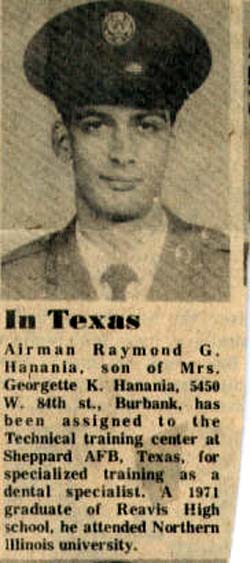
Ironically, my father was always proud of his military service. He was born on what later became Veteran’s Day in American, on November 11, in 1903.
I was inspired to military service also in the 1970s during the end of the Vietnam War. I enlisted in the U.S. Air Force and served as a U.S. Air Force F-111 Vietnam Support airbase stateside until the war ended. And I am proud to say I was honorably discharged, serving more than 10 years in the Illinois Air National Guard in Peoria, Illinois a city that had a very large settlement of American Arabs of Lebanese heritage.
As America remembers Pearl Harbor on this 75ht Anniversary, I also hope they remember the many immigrants who set aside their livelihoods and families to put on a military uniform in service and defense of their country.
This nation was built by immigrants who legally entered this country and embraced American culture completely. They didn’t forget their heritage and their original homelands but being an American was the most important goal of their lives. They quickly learned English and assimilated proud of their American citizenship and proud of their cultural and religious heritage.
As we remember Pearl Harbor, we should also remember them.
(Ray Hanania is an award winning former Chicago City Hall reporter and political columnist. Email him at rghanania@gmail.com. He is the author of the only book on the history of Chicagoland’s Arab community, “Arabs of CHicagoland,” 2005, Arcadia Publishing.)


- Israelisnipers shooting and killing hospital workers in Gaza - December 11, 2023
- CAIR Condemns Israeli Executions of Wounded, Unarmed Palestinian in West Bank - December 11, 2023
- Arab and Muslim American voters face a “simple choice” between Biden’s inhumanity and Trump’s edgy politics - December 9, 2023


















